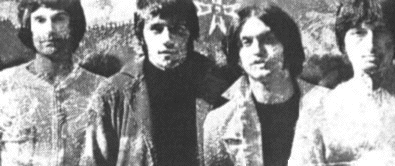

The Kinks are one of the most underrated bands in the history of rock. For some reason, they never quite attained the status of other British groups like The Who, The Rolling Stones, or The Beatles. In my opinion, they are superior to all three.
Although best known for their early hits ("You Really Got Me," "Set Me Free," "Tired Of Waiting For You," "All Day And All Of The Night," etc.), the Kinks created their most timeless music from 1966-71.
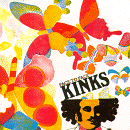 Face To Face (***1/2, 1966) found
leader Ray Davies writing music for himself instead of trying
to please others for the first time. The result - The Kinks most
satisfying record up to that point. Face To Face includes
the great "Sunny Afternoon" as well as lesser-known
gems like "Rose Won't You Please Come Home," "House
In The Country," "Rainy Day In June," and "Too
Much On My Mind."
Face To Face (***1/2, 1966) found
leader Ray Davies writing music for himself instead of trying
to please others for the first time. The result - The Kinks most
satisfying record up to that point. Face To Face includes
the great "Sunny Afternoon" as well as lesser-known
gems like "Rose Won't You Please Come Home," "House
In The Country," "Rainy Day In June," and "Too
Much On My Mind."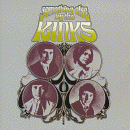
Something Else (****, 1967) followed with more of the same, only Davies songs were even better this time, more well-rounded (The Kinks' sloppy garage-band sound was getting a little old for him by now). "Two Sisters," "Situation Vacant," and "Afternoon Tea" are catchy and inventive, "Lazy Old Sun" is a psychedelic masterpiece, "End Of The Season" features Davies in retro-vaudeville mode, and "Waterloo Sunset" is the Kinks' all-time classic
 Village
Green Preservation Society
(1968, *****) is the group's finest hour. This level of creativity
was never seen again from Davies, and this was the last Kinks
album to feature the original lineup (Ray & Dave Davies, Pete
Quaife, and Mick Avory). Tracks like "Village Green,"
"Animal Farm" (Quaife's personal favorite), and "Sitting
By The Riverside" are simply unlike anything other music.
This is a record to pick up soon and give it a few listens before
judging it... you won't be disappointed!
Village
Green Preservation Society
(1968, *****) is the group's finest hour. This level of creativity
was never seen again from Davies, and this was the last Kinks
album to feature the original lineup (Ray & Dave Davies, Pete
Quaife, and Mick Avory). Tracks like "Village Green,"
"Animal Farm" (Quaife's personal favorite), and "Sitting
By The Riverside" are simply unlike anything other music.
This is a record to pick up soon and give it a few listens before
judging it... you won't be disappointed!
Percy (Soundtrack) (1971, ***1/2) is a bizarre collection
of instrumental movie themes and pleasant Davies tracks, including
some of his finest songs, "God's Children," "Moments,"
and "The Way Love Used To Be."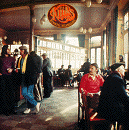
Muswell Hillbillies (1971, ****) is the last great Kinks album. The title is a pun on the place where Davies grew up (Muswell Hill) and the theme throughout the songs is similar to the Village Green LP. The sound (kind of countrified-Kinks) is different from other Kinks records and the songs are, once again, top-notch. This was their first album for RCA and the highlights include "20th Century Man," "Holiday," and "Holloway Jail."
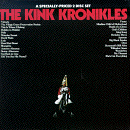 The
Kink Kronikles (1972,
*****) is an excellent U.S. compilation - part greatest hits,
part rarities, and part album tracks. This is a good place to
start if you're unfamiliar with The Kinks late '60s-early '70s
material. Most of the essentials are here: "Sunny Afternoon,"
"Waterloo Sunset," "Shangri-La," "This
Is Where I Belong," "Wonderboy," and "Lola,"
just to name a few. My one complaint is that it includes only
one the title track from Village Green, but hey, there's
another good reason to get the Village Green album and
this one!
The
Kink Kronikles (1972,
*****) is an excellent U.S. compilation - part greatest hits,
part rarities, and part album tracks. This is a good place to
start if you're unfamiliar with The Kinks late '60s-early '70s
material. Most of the essentials are here: "Sunny Afternoon,"
"Waterloo Sunset," "Shangri-La," "This
Is Where I Belong," "Wonderboy," and "Lola,"
just to name a few. My one complaint is that it includes only
one the title track from Village Green, but hey, there's
another good reason to get the Village Green album and
this one!
The Great Lost Kinks Album (1973,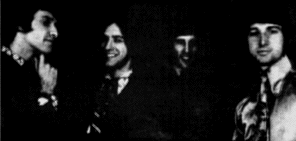 *****) is well-worth seeking out and spending more that you would
on a normal album (if it's in good shape, of course... I paid
$15 for my tattered copy). Although not truly a "lost"
album, it nonetheless includes some of Davies' best work ("Till
Death Do Us Part," "Where Did The Spring Go," "Lavender
Hill,"). Most of the tracks are outtakes from 1967-68, with
some rare B-sides and songs written for TV shows too. The LP went
out of print very soon after it was released, but bootleg CDs
are in general circulation.
*****) is well-worth seeking out and spending more that you would
on a normal album (if it's in good shape, of course... I paid
$15 for my tattered copy). Although not truly a "lost"
album, it nonetheless includes some of Davies' best work ("Till
Death Do Us Part," "Where Did The Spring Go," "Lavender
Hill,"). Most of the tracks are outtakes from 1967-68, with
some rare B-sides and songs written for TV shows too. The LP went
out of print very soon after it was released, but bootleg CDs
are in general circulation.
Other releases by The Kinks from this period include The Kink Kontroversy (1966, **1/2), Arthur (1969, ***), and Lola Verses Powerman And The Money Go Round (1970, **1/2).
